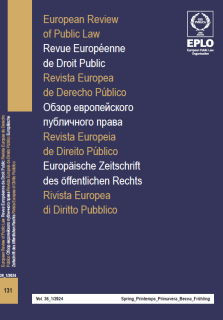
Navigating the EU Regulatory Landscape on Artificial Intelligence: Complexities and Debates in Public Law
Alicia I. Saavedra-Bazaga
Public Law Professor, CUNEF Universidad, Madrid, Spain
This article aims to explore the dynamic regulatory landscape surrounding artificial intelligence (AI) within the European Union. By tracing the evolutionary path from initial soft-law measures to the current shift towards a comprehensive legislative approach, the article provides valuable insights into the multifaceted dimensions of AI regulation. The analysis focuses on the EU’s proposal for AI regulation, examining its key aspects and delving into the nuanced complexities introduced by recent amendments. By scrutinizing the proposal, the article sheds light on the intricate balance policymakers seek between fostering innovation and safeguarding against potential risks associated with AI technologies. In addition to the internal developments, the article takes a broader perspective, exploring the global context of AI regulation. This includes insights into how other regions, such as the United States, China, and the United Kingdom, are approaching AI governance. Understanding these global dynamics is crucial for situating the EU’s regulatory efforts within the broader international landscape. As the regulatory journey unfolds, the article does not merely provide a snapshot but engages with the ongoing debates and discussions shaping the finalization of the proposal. By identifying and analyzing key discussion points, the article serves as a timely resource for stakeholders involved in or impacted by the evolving AI regulatory landscape. It seeks to contribute to the informed discourse surrounding AI governance, fostering a deeper understanding of the challenges and opportunities presented by emerging technologies.
Keywords: Artificial intelligence; European Union regulation; AI governance; public law
Cet article vise à explorer le paysage réglementaire dynamique entourant l’intelligence artificielle (IA) au sein de l’Union européenne. En retraçant l’évolution depuis les mesures initiales non contraignantes jusqu’à l’évolution actuelle vers une approche législative globale, l’article fournit des informations précieuses sur les multiples facettes de la réglementation de l’IA. L’analyse se concentre sur la proposition de réglementation de l’UE en matière d’IA, en examinant ses principaux aspects et en approfondissant les complexités introduites par les récents amendements. En examinant la proposition, l’article met en lumière l’équilibre complexe que les décideurs politiques recherchent entre la promotion de l’innovation et la protection contre les risques potentiels associés aux technologies de l’IA. Outre les développements internes, l’article adopte une perspective plus large, en explorant le contexte mondial de la réglementation de l’IA. Il s’agit notamment de comprendre comment d’autres régions, telles que les États-Unis, la Chine et le Royaume-Uni, abordent la gouvernance de l’IA. Il est essentiel de comprendre cette dynamique mondiale pour situer les efforts réglementaires de l’UE dans le paysage international plus large. Au fur et à mesure de l’évolution de la réglementation, l’article ne se contente pas de fournir un instantané, mais s’engage dans les débats et les discussions en cours qui façonnent la finalisation de la proposition. En identifiant et en analysant les principaux points de discussion, l’article constitue une ressource opportune pour les parties prenantes impliquées dans l’évolution du paysage réglementaire de l’IA ou touchées par celui-ci. Il vise à contribuer à un discours éclairé sur la gouvernance de l’IA, en favorisant une meilleure compréhension des défis et des opportunités présentés par les technologies émergentes.
Mots-clés: Intelligence artificielle; réglementation de l’Union européenne; gouvernance de l’IA; droit public
*This article is based on my presentation within the framework of the second session on the topic: ‘Navigating the EU Regulatory Landscape on Artificial Intelligence: Complexities and Debates in Public Law’ at the annual meeting of the European Group of Public Law in 2023, on ‘Digital Transformation: Technology, Fundamental Rights, Public Administration’, which took place from September 15 to 17 in Legraina/Greece.





















